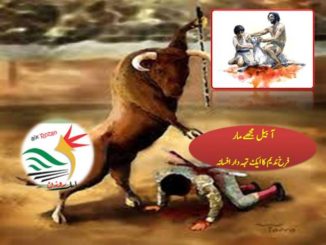
Thandia’n Chha’nwa’n, Mithrey Geet: A Medley of Punjabi Verse Translated
by, Ms Komal Shahzadi
ٹھنڈیاں میریاں چھاواں مٹھڑے میرے گیت
Melodious are my songs, and soothing my shades
Punjab, my beloved province, the place of my birth and life where scorching, tandoori heat of summers naturally develops a physical yearning for shades of trees and waters of rivers and at the same time an aesthetic quest to compose melodious songs and lyrical ballads in its inhabitants. Present medley of five poetic pieces of varying length is an amateur attempt to translate eminent Punjabi versifiers such as Sharif Kunjahi and Baqi Siddiqui as a tribute to “the land of five rivers”. This selection is small in number but vast in scope since it covers a range of diverse genres like ballad, haiku, elegy (in free verse), ghazal, and nazm (lyrical poem). It also serves as a dialogue between these voices of poetic art.
Following poem with its narrative element, story of some unknown rustic character, abrupt beginning, simple language, repetition of stock phrases, melodious tone that makes it easy to sing, is a good example of literary ballad where theme though tragic in nature is very much grounded in eastern philosophy of rural life.
سوہل جئی کڑی سی ملوک جیا انگ سی
کالی اوہ دی اکھ سی تے چٹا دودھ رنگ سی
اکھیاں دے سومے وگےڈولی ساری بھج گئی
ماں پیاں دے فیصلے تے او وچوں وچ رجھ گئی
ورے پچھوں گھر اوندھے کاکا اک ہو پیا
گھر وچ خوشیاں دا میلہ جیا لگ گیا
کہن لگی شکر اے جے پیو اتے گیا اے
رب میرے ماں پیاں دا مان رکھ لیا اے
BALLAD
There she was, an innocent and fragile maiden
Her eyes were dark and milky-white the complexion
She wept her bridal tears and smeared the palanquin
To marry her parents’ choice she wither’d from within
One year passed and she gave birth to a little boy
The entire household became a scene of sheer joy
Baby hath the flat head and fleshy his nose was
Splintered his eyes and jet-coal the complexion was
She thanked God for saving her parents’ honour:
By making child the replica of his father
If the ballad talks about traditional acceptance of cultural norms then following Haiku is an attempt on the theme of liberty. Being impressed by the Japanese form the poem is unique in conveying vast meanings in brief, imagist lines.
اچیاں کندھاں
ڈک نہ سکن
پھلاں نی خوشبو
ایس نظم دا عنوان اے: آزادی
HAIKU
Deep vessels
Can’t contain
The fragrance of flowers
Title of the poem is “Liberty”
If this haiku is forward looking in its theme and promise of future freedom, following poem is full of nostalgia of the past– how someone’s presence or absence has topographical effects. Same place like heaven is changed to deserted places like graveyards.
اج اوس پنڈ دے میں کولوں لنگ چلیاں
جتھوں کدی ھلنے تے دل نئیں سی کردا
جتھے مینوں نت پیا رھندا کوئی کم سی
کم کی سی سچی گل اے جتھے تیرا دم سی
تیرے دم نال پنڈ حج والی تھاں سی
کڈا سوھناں ناں سی
دوروں رکھ تک کے تھکیویں لیہہ جاندے سن
بانئیں مار مار کے او اینج پئے بلاندے سن
سورگ دا سواد آئے جنہاں ھیٹھ کھلیاں
اج اونہاں رکھاں دے میں کولوں لنگ چلیاں
اج میرے پیراں نوں نہ کھچ کوئی ہوندی اے
پنڈ ولوں آئی وا پنڈے نو نہ پوندی اے
کسے دیاں چاہواں میرا راہ نئیں ڈکیا
کوٹھے اتے چڑھ کے کسے نے نئیں تکیا
کیکراں دے اولے ہو کے سب توں اکلیاں
اج اینج پنڈ دے میں کولوں لنگ چلیاں
جیویں کوئی کسے گستان کولوں لنگدا
YOUR VILLAGE
Today I get pass along that village
Once I didn’t want to leave for a second
Where I just went for countless excuses
Real excuse, frankly, was your presence
Your presence made it Makkah of my heart
With what a romantic name it was called
A mere look at its trees was refreshing
Waving, dancing they looked so welcoming
To stand underneath them felt like heaven
I’m getting pass along those trees and elms
No magnet compels my feet towards itself
No wind strains my torso the village ward
No one’s love has picked the thorns of my path
No one has climbed roof to pay me a glance:
Gazing through acacias standing all alone
I bypass village, today, in a tone
Like someone bypasses burial ground
People die and get a grave in burial places but Ghazal in the subcontinent has attained a permanence of its sort. It is said to be the most ancient form of poetic expression that is still practiced by modern poets. Having a sequence of ash’aar every two lines are self contained couplets conveying theme and meaning in full. Following couplet is a masterful example of praise of beloved’s eyes in ghazal-like exaggeration:
او رھن لٹ بوریاں وانگ پھردے،اک وار اوندھیاں جنہاں ویکھیاں نیں
نشے گتیاں کھیویاں مدھ بھریاں جاگو میٹیاں مست مستان اکھیاں
They roam rapturously ever after:
Ones who once get a chance to glance at her
Vinous, almond-shaped, intoxicated,
Waking-sleeping, beguilingly-glazed eyes
If the poet of previous verse is immersed rapturously ever after in the beauty of beloved’s eyes, following Nazm (lyrical poem) juxtaposes the idea of temporariness of life and the decline in the beauty of a young girl in a very subtle and suggestive manner:
تیرا پنڈا پوری توت دی
تیری لگراں ورگی بانہہ
تیرے بل نے پھل کریر دے
تیرا جوبن ون دی چھاں
ایہہ چھاواں سدا نہ رھنیاں
رھے سدا اوس دا ناں
اساں پنڈ نہ پانے جوگیاں
اساں بوہتا نئیں پڑاں
کس پکے پا کے بیٹھنا
ایہہ دنیا اک سراں
تیرے جوبن وانگوں گوریے
اسی سب مسافر ھاں
A LYRIC
You are so young, fresh and fragile
Your lips spark like petals of flow’rs
Your youth is like the soothing shade
Of a willow – under the sun
This shade will remain not the same
Ev’rlasting is the name of One
We, the mystics and the wand’rers
Despise cities and citadels
No one hath a permanent stay
World is very much like a stage
We’ll depart after we perform
Like your bloom, O Gori, is going to decay!
About the author
Komal Shahzadi is a faculty member in Department of English at the International Islamic University, Islamabad and has published articles about Pakistani literature. Her areas of interest include stylistics, postcolonial literature, translation studies and creative writing.




